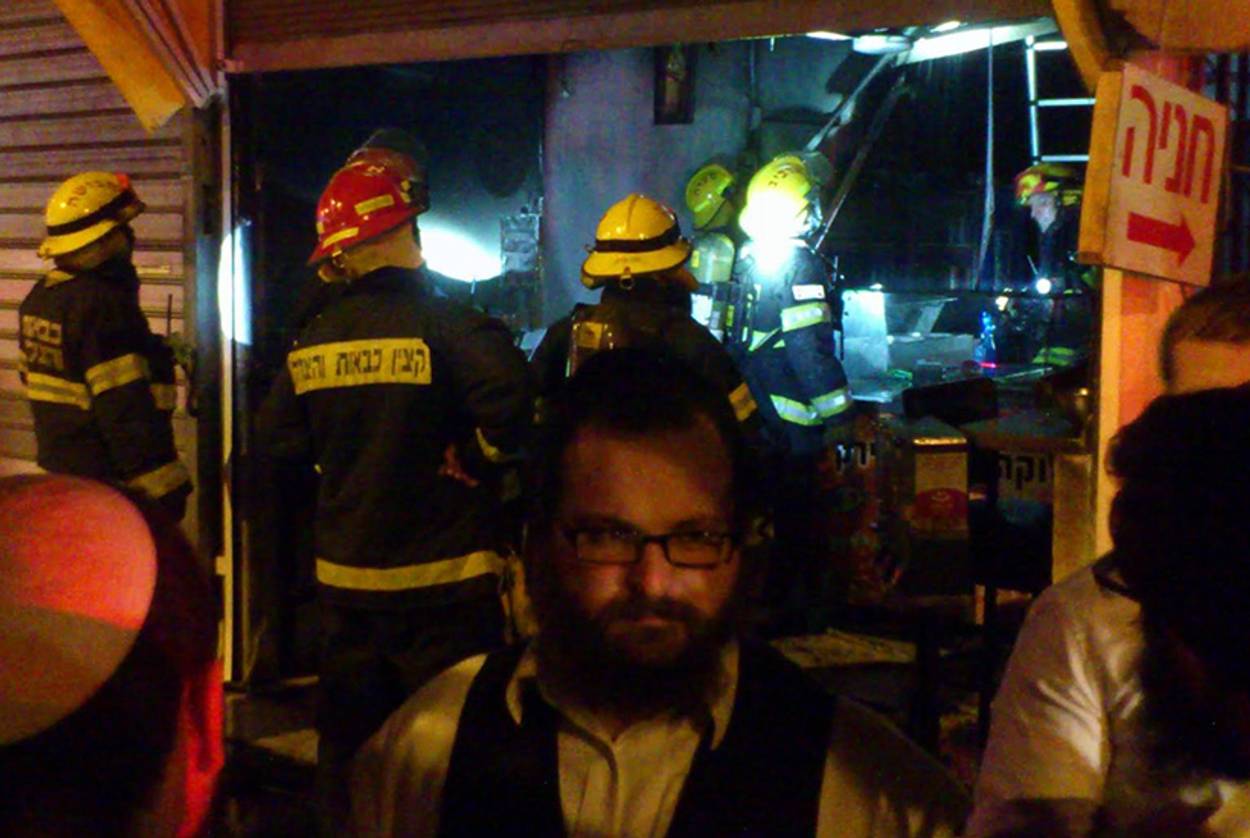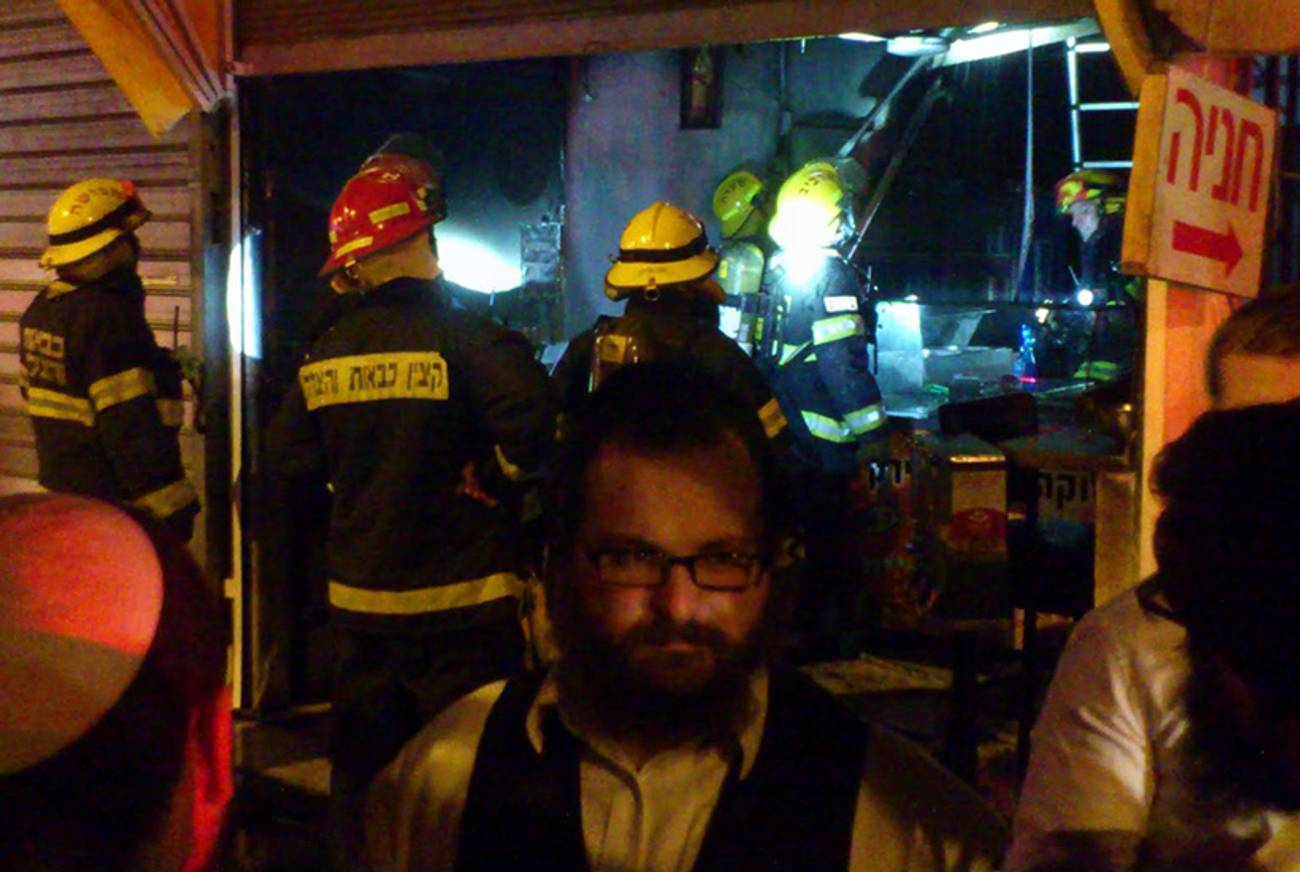An Ultra-Orthodox Shomrim Patrol Celebrates Five Years in an Unexpected Place: Israel
Even in the Jewish state, ultra-Orthodox Jews look first to their own, and not to secular authorities, for security




“Rotter, what are you doing here?” the teenager says and leans closer into the face of Haim Rotter. “Why don’t you go look for rapists and molesters? They’re all in your neighborhood, we don’t have those here.”
He’s one of six, all wearing track suits and large white and black kippot, a look popular in working-class Israeli neighborhoods. Rotter doesn’t blink. He is the founder of the first Shomrim security patrol—a private, all-volunteer neighborhood watch—in Bnei Brak, a Tel Aviv suburb dominated by ultra-Orthodox Jews. Rotter and a few carloads of his fellow Shomrim came to the falafel stand in response to a call for back-up by Bnei Brak police and arrived to find the teens outside the restaurant.
Moments later, the teens slink off, one of them mouthing a death threat to Rotter as they go. Rotter, a stout 26-year-old Satmar Hasid, climbs into his unmarked car and parks on Rabbi Akiva Street, one of the main thoroughfares of Bnei Brak, and waits for the next call.
Last month, Rotter’s Shomrim marked its fifth anniversary. Last year, an additional branch began operating in Elad, another predominantly ultra-Orthodox suburb about 10 miles east of Tel Aviv. The groups are modeled on Shomrim patrols that operate in other ultra-Orthodox enclaves around the world, from Brooklyn to London and Melbourne. Those groups function as a combination neighborhood watch and AAA service, responding to calls about suspicious activity and flat tires. They also serve as crucial go-betweens for cops and ultra-Orthodox communities in places where religious Jews don’t always feel comfortable going to civilian law enforcement.
That anxiety has its roots in the longstanding prohibition against mesira—turning over fellow Jews to non-Jewish authorities. In the Jewish state, the fact that the police are not gentiles doesn’t necessarily change things for ultra-Orthodox residents, many of whom are already familiar with Shomrim services from having lived or stayed with family elsewhere in the world. Rotter says that for many residents of Bnei Brak, secular state institutions like the police remain foreign, even if staffed by their fellow Jews, and they worry that complaining to police could cause them to face repercussions from their neighbors. “In the haredi environment they don’t want to call the police or get involved in things, or they’re worried someone will hurt them,” Rotter said. “So, they call us and we can be a bridge between them and police.”
***
Five years ago, Rotter was working as a paramedic. One night, he caught a burglar in the act in Bnei Brak. Hopped up on adrenaline, he decided to recruit a few friends to form a neighborhood watch, with Rotter acting as the dispatch and officer in charge. In time, the men acquired walkie-talkies and authority. Today, Rotter has 150 volunteers—“another 300 eyes on the street”—managed by a central call center run out of a residential apartment in Bnei Brak. On a normal night, they respond to dozens of calls and often arrive well before the police.
The Shomrim only have the ability to make citizen’s arrests, holding assailants until the police arrive. They are unarmed and not allowed to use force against the people they encounter. Rotter says the group is funded by private donations and money the volunteers pay out of their own pockets, and on any given night the members—mostly young, unmarried men—come in whatever cars they can get, often borrowed from their parents. Most of the patrol members work in local stores or restaurants or at charities and nonprofits.
They are a motley bunch, from a variety of hasidic sects and other ultra-Orthodox groups. Some are less religious. One of these, Rafi Kornfeld—who grew up in a religious family and goes by the nickname “Kobra”—stood on a Bnei Brak street corner on a recent night in his tight white T-shirt, eating cholent out of a plastic container. He told me he’s spent the past three and a half years bodybuilding and was the second runner-up in the 75-kilogram weight class in the 2011 Mr. Israel competition. He posts videos of himself on YouTube lifting a car and blocks of concrete. “I only have 6 percent body fat,” he said, tapping his thigh. “Feel my leg.”
***
The patrols deal with a bizarre array of crimes, some unique to Bnei Brak, which can feel at times like an overgrown shtetl. The Hanukkah season typically brings an annual spree of menorah thefts, with burglars looking to steal the silver candelabras to pawn across central Israel, Rotter said. Another volunteer described the popularity of stealing mezuzot, mainly in order to sell the scrolls inside, which can fetch around 100 shekels a piece. One man they recently caught stole more than 100 mezuzot from a single Bnei Brak building. But that’s not all: One man purloined several dozen brassieres from drying racks on apartment balconies and rooftops.
Brig Gen. Albert Ohayon, the former commander of the Dan sub-district, which covers Bnei Brak and Ramat Gan, said he appreciated Rotter’s work. “They help out a lot, they’re an extra set of eyes on the street, like a civil guard,” Ohayon said. They are especially helpful, he noted, in handling missing-person cases—runaways, especially. But the group’s members are unlicensed and untrained, which raises the potential for trouble. Orit Friedman, the spokesperson for the Tel Aviv District described them as “a pirate organization that has no coordination with the police.” But she also added that the Tel Aviv police “are neither in favor or opposed to them.”
Efforts to have members of the group undergo training and licensing by the state to qualify them as an official civil guard have failed for two main reasons. First, members like Rotter, a Satmar Hassid, are from ultra-Orthodox sects that don’t officially recognize the state of Israel and its institutions, and second, it would mean that they could no longer operate as they please and would have to work within an official framework.
As things stand, the Shomrim maintain a useful distance from the police, especially when it comes to the most sensitive crimes of all: sex abuse. Rotter gave me a flyer the Shomrim distributed in Bnei Brak recently, which describes “terrible, sinful people circling thorough our neighborhood recently bothering our children in the worst ways possible” and calls on people to report such offenders to the Shromrim. It’s a deeply complicated issue: In Israel as elsewhere, secular authorities often suspect ultra-Orthodox communities of hushing up sex crimes and harassing complainants. But that is slowly starting to change, in part because of efforts like Rotter’s to meet the community’s concerns. “We want to protect the public from these people, but also to protect them, so that he can still get married and his family isn’t destroyed,” Rotter told me earnestly. “If someone is arrested as a pedophile it can destroy their family, their chances to get married, their brothers’ chances.”
“It’s still in its baby steps, but we’re seeing more and more rabbis telling people to go to the police, or themselves bringing information to the police,” said Shabtai Gerberchik, a former journalist for the Haredi station Radio Kol Hai and the national religious newspaper Makor Rishon who in September became the first police spokesman for the ultra-Orthodox press. “They’ve started to realize that the only way to deal with it is through the police, we’re the only ones who can get these people off the street. The old way of the community just kicking them out would just send the problem to someone else’s neighborhood.”
***
“This is our war room,” Meni Mendelovitz joked, as he ate a piece of kugel at a small restaurant on Hazon Ish street at 2:30 a.m. Inside the cramped café, which has been closed for hours, a group of Shomrim guys sit and chat, discussing the recent sex-crimes case involving Israeli singer Eyal Golan, a conversation that during daylight hours would be trayf at a place like this.
A girl in halter top and a pink helmet came down Hazon Ish, a major thoroughfare, on a scooter. Mendelovitz pointed at her. “This is a major street; she’s just passing through, no big deal,” Mendelovitz said. “But take the Satmar neighborhood, it’s a closed off neighborhood, you don’t go in there unless you’re from there or you’re looking for something. A girl like that goes through there they’ll throw eggs on her, or they’ll call us right away so things don’t get out of hand.”
The boys joke around a lot, giving one another a hard time. A number of them have smart phones—highly controversial in the ultra-Orthodox world—and are out and about in the neighborhood at an hour that their more bookish peers in the yeshivas are either studying or long since asleep. They’re familiar with the common perception that the Shomrim and other organizations like it take young men who are not the most promising students—the belief being that if they were more promising yeshiva students they wouldn’t be here at all. “We don’t take yeshiva boys,” Mendelovitz told me. “We don’t want people to say, look at the Shomrim, they’re taking yeshiva boys and ruining them. For us, we think it’s more important that a yeshiva boy study than be out here with us.”
Just then, his radio crackled with a call of a blaze on the corner of Abuhatzeira and Jabotinsky. The volunteers scurried out of the restaurant and into their cars, rolling down to Jabotinsky to the same falafel stand they were at just a couple hours earlier, when the cops called for help dealing with the rowdy teens. A fire truck was battling the remnants of a suspected arson that left the building scorched and the ceiling caved in. Some of the Shomrim immediately suspected the same teenagers who were tossed out of the building earlier in the night.
At this junction Bnei Brak meets Pardes Katz, a poor neighborhood and the only one in Bnei Brak that is, for now, not majority ultra-Orthodox. Once a synonym for crime, Pardes Katz was the site of a bloody gang war in the 1980s and 1990s in which more than a dozen people were killed. It’s the uglier, rougher step-sister of Bnei Brak, and it still hasn’t managed to shake the stigma it earned decades ago. “Pardes Katz stays Pardes Katz,” one of the Shomrim said and flicked a cigarette in a pool of water collecting next to a fire truck.
It was around 4:30. Before long the sun would be up again, bringing the end to another night shift. The Shomrim went home, got some rest, and came back the next night to do it all over again.
***
Like this article? Sign up for our Daily Digest to get Tablet Magazine’s new content in your inbox each morning.
Ben Hartman is the crime and national security reporter for the Jerusalem Post. He also hosts Reasonable Doubt, a crime show on TLV1 radio station in Tel Aviv. His Twitter feed is @Benhartman.
Ben Hartman is the crime and national security reporter for the Jerusalem Post. He also hosts Reasonable Doubt, a crime show on TLV1 radio station in Tel Aviv. His Twitter feed is @Benhartman.